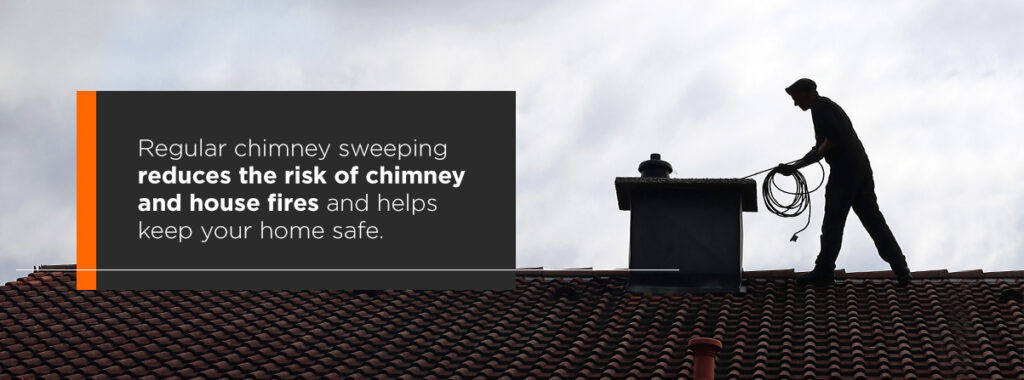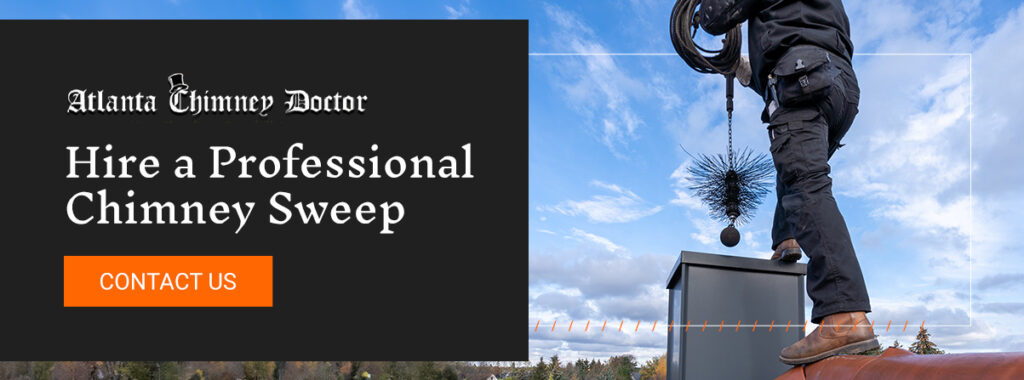If your fireplace isn’t working as well as it once did, you might need to have your chimney cleaned. Even if you haven’t noticed any changes, regular chimney inspections and sweeping protect your home from chimney fires and other hazards. This article covers the main signs that your chimney needs cleaning, how often you should clean it and other important information about chimney cleaning.
How to Tell if a Chimney Needs Cleaning
If you notice any of the following signs, it’s best to contact a professional chimney sweep to inspect and clean your chimney. Here’s what to look for to determine if your chimney needs to be cleaned.
- You notice increased creosote and soot: Creosote is a highly flammable, tar-like substance created when wood burns. It builds up in chimneys of wood-burning fireplaces and is a major cause of chimney fires.
- The room fills with smoke: Smoke blowing into your home instead of going up the chimney is called a backdraft. Backdrafts can have several causes. The damper may be closed, the wood may be wet, or the fire may not have enough oxygen to sustain itself. However, a chimney blocked with creosote and soot can also cause smoke to enter the room.
- You have smoke stains around the fireplace: Even if the backdraft isn’t strong enough to fill the room with smoke, you could still have smoke coming into the house and staining the walls around the fireplace.
- Animals nest nearby or in the chimney: Even if you have a chimney cap or rain cover, birds and squirrels can be attracted to the warmth of the chimney, especially if it’s dirty enough inside that not a lot of smoke is going outside. Nests in the chimney or covering vents restrict airflow and can be a fire hazard.
- You hear unusual sounds: A scratching or flapping noise coming from your chimney can indicate a flue blockage, either from debris or a nesting animal.
- Fires are difficult to start and burn poorly: Creosote buildup, debris and animal nests all restrict airflow, making it difficult to light a fire or keep it burning as well as you want.
- The damper is black: A black damper also indicates a buildup of creosote and soot, meaning it’s time for a chimney cleaning.
- Your fireplace has black, oily stains: This is creosote. Seeing it in the fireplace likely means it’s all over the chimney.
- Your fireplace or flue smells like smoke: Of course, you expect a fireplace to have a faint smell of smoke, especially when there’s a fire burning. However, if there’s a strong smell of smoke even when there’s no fire, that’s a sign that your chimney needs to be cleaned. That familiar “campfire” smell comes from creosote, and a stronger smell can indicate more buildup.
- Soot or debris falls into the fireplace from the chimney: Non-wood debris in your fireplace can indicate that your chimney is blocked or failing. Depending on what the debris looks like, it could be pieces of an animal’s nest or pieces of your flue liner, chimney or rain cap. If these components are deteriorating, you’ll likely need some repairs as well as a good cleaning. Call a chimney professional right away, and don’t burn anything in your fireplace until you remedy the situation.
How Often Should You Clean Your Chimney?

You should clean your chimney annually or when the buildup is 1/8-inch thick. The National Fire Protection Association (NFPA) Standard 211 advises annual inspections and cleaning if needed. Regular chimney sweeping reduces the risk of chimney and house fires and helps keep your home safe.
Several factors affect how quickly creosote and soot build up inside your chimney, including where the chimney is located and how often you use your fireplace. If your chimney is on an exterior wall, creosote will buildup faster than if it was completely internal due to greater temperature changes. Colder temperatures mean smoke condenses more quickly, sticking to your chimney rather than escaping upward.
If you use your fireplace frequently and the chimney builds up creosote faster, you may need to clean it more often. Burning softwoods, such as pine, or damp wood that hasn’t dried or seasoned properly can also cause creosote to build up more quickly.
You can check to see how much creosote is in your chimney yourself. First, open the damper. Carefully reach inside your chimney and remove some soot. Examine the area with a flashlight to determine the soot’s thickness. Even if the soot isn’t very thick, it still needs to be cleaned if you notice signs of creosote, which is shinier and stickier.
Frequently Asked Questions About Chimney Cleaning
Here are a few other important things to know about chimney cleaning:
- Do chimneys for gas fireplaces need cleaning? Gas fireplaces also need cleaning. Although they don’t produce creosote or soot, you could still have airflow issues due to animals or debris.
- Do I need a chimney cap? A masonry chimney cap prevents pests and moisture from entering your chimney and contains sparks and embers inside the chamber. If you use your fireplace regularly, you’ll still need to engage in regular professional chimney cleaning, but a cap can block other kinds of debris from collecting in your chimney.
- Can I use a fireplace cleaning log instead of hiring a chimney cleaner? While fireplace cleaning logs can remove some buildup, they can’t replace a professional cleaning. These logs contain chemicals that turn creosote from a sticky substance to a dry, flaky one, so it’s more likely to fall into the fireplace, but they can’t clean your chimney as thoroughly.
- Do I need to clean my chimney if I don’t use the fireplace? You might not need to clean your chimney annually if you never or rarely use it. However, it’s still a good idea to get it inspected since it could have water damage, debris blocking the chimney or animals nesting inside and causing issues.
Hire a Professional Chimney Sweep
Chimney cleaning is dirty work and is best left to the professionals to ensure it’s done correctly. Regular inspections, cleaning and maintenance ensure your fireplace and chimney operate effectively and safely.
At Atlanta Chimney Doctor, all our chimney sweeps are certified by the Chimney Safety Institute of America (CSIA). You can trust that we’ll clean your chimney thoroughly and carefully and leave your home clean when we’re finished. In addition to professional chimney cleaning, we can also handle maintenance and repairs, including chimney liners, caps and masonry. For all your fireplace and chimney needs, Atlanta Chimney Doctor will keep your family safe.
If your chimney needs cleaning or inspection, fill out our online contact form, and we’ll reach out to schedule services.

